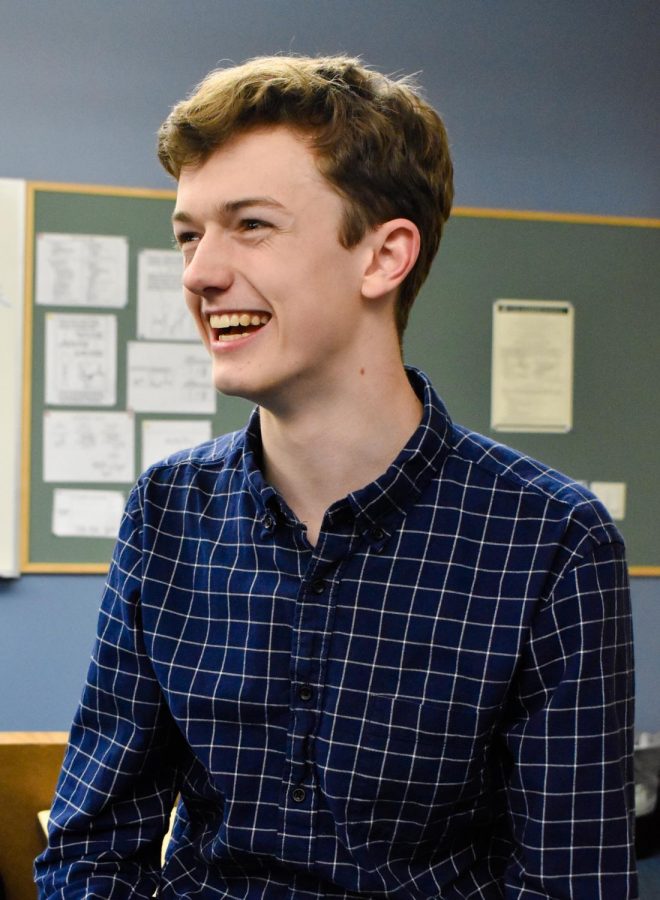Humans of Harker: Driving towards satisfaction
Oliver Doig finds fulfillment in working with cars
“The cars…give you a sense of satisfaction when you complete a job and get in the car like ‘Oh! That thing doesn’t squeak anymore. Or, oh, my oil isn’t bursting out of the hood. That’s awesome.’ It’s good to have a sense of accomplishment and working on cars really does that because it’s a tangible difference with every single thing you fix,” Oliver Doig (12) said. “With the vast majority of things, it’s a lot of just really simple, basic quality of life stuff that you are actually capable of improving for yourself, and that’s awesome.”
Clad in a checkered blue shirt, looking relaxed and carefree, Oliver Doig (12) exudes charm and a laughter that fills the auditorium. His eyes twinkle with kindness, honesty, and loyalty as he leans back in his chair and explains a story.
Oliver’s dry wit and funny jokes bring a smile to his friends’ faces in the stressful high school environment. His friends love to be around him and feel good while doing so.
Oliver’s friend Sayon Biswas (12) has fond memories of driving to prom with Oliver and hanging out with him at Five Guys, just talking for a long time.
“Oliver is someone I haven’t known for a long time, but it feels like I have known him for years,” Sayon said. “He has a great sense of humor, is great to be around and is one of the most dependable people in my life.”
Sayon also admires Oliver’s flexibility and loyalty. “People don’t know how loyal he is. When he joined our friend circle, he gelled instantly. He is super easy to mesh with.”
Oliver appreciates talking to people and being down-to-earth with proper conversations.
“I think it’s just good to have actual proper connections with people instead of shallow surface level interactions on a day-to-day basis,” Oliver said. “While acquaintances are great, I think it’s important to have some people in life that you’re actually close to and you can be really open with.”
Oliver loves cars, but his passion for cars is not limited to admiring fancy old European cars. He is a very hands-on person and he loves to work on them himself. As a junior, he developed an interest in cars when he started listening to Car Talk, an NPR podcast. As he got hooked to the funny, entertaining, and educational show, he grew confident in his abilities to fix a car.
Deciding to do something he was passionate about and to gain real life skills in the process, he got his first awful and horribly broken down car – a BMW 1986 E30 325e in October of 2018.
“My goal with the car is essentially fix it up to the point where it’s drivable, then soup it up with a bunch of crazy performance mods and take it on the track and race it around and have fun with it,” Oliver said. “But [my goal is] also to learn how to do basic mechanics and car repair and stuff because it’s just super applicable in real life.”
Oliver’s admirable tenacity and dedication to his abilities led to fixing his car, no small feat, with online help through communities like e30zone and r3vlimited, along with his dad’s friend as a mentor who showed him the ropes and let him use his shop.
“I did a proper marathon session on my car,” Oliver said. “My very first time actually working on my car and getting it on a lift and getting under there and installing a bunch of stuff and just kind of going wild…finishing a twelve-hour session of straight work, finishing that was super satisfying, super fun.”
According to friend Alex Rule (12), Oliver is always talking about his cars and he loves hearing about the work Oliver has done on his car.
After satisfactorily finishing his job, Oliver finds fulfillment, as even fixing something small makes a material difference.
“The cars…give you a sense of satisfaction when you complete a job and get in the car like ‘Oh! That thing doesn’t squeak anymore. Or, oh, my oil isn’t bursting out of the hood. That’s awesome.’ It’s good to have a sense of accomplishment and working on cars really does that because it’s a tangible difference with every single thing you fix,” Oliver said. “With the vast majority of things, it’s a lot of just really simple, basic quality of life stuff that you are actually capable of improving for yourself, and that’s awesome.”
Not only under the hood, Oliver also uses his problem solving skills to do freelance web development in a startup he started with his friends.
“Programming is relatively easy problem solving that comes naturally to me and is not really super work-intensive,” Oliver said. “It’s satisfying to finish something and build something that people actually use.”
Oliver’s computer science teacher, Anu Datar, appreciates Oliver’s ability for abstract thinking which will make him a successful computer scientist. Although, Oliver might present a persona of a carefree attitude, Datar observed that Oliver was keen on improving things and fixing them.
“He’s a very, very smart kid,” Datar said. “He has a sharp brain. He understands things. He gives this laid back…kind of outward appearance, but I think deep down he really likes computer science and he wants to put in effort to understand the core concepts. So he does put in more effort than what he portrays or shows outwardly.”
Oliver appreciates the balance that he has been able to achieve between school and social life and hobbies due to the flexibility provided by his parents. Undoubtedly, that seems to be the secret of his happiness.
“My parents have been super relaxed with kind of letting me do what I want and having independence. It’s really important to have a balance between school work, social life, and hobbies,” Oliver said. “And while my balance may skew a little farther towards social life and hobbies, I think it is important to know yourself and develop independence before you go to college and before you live your own life.”
Oliver deeply cares about many causes, one of which is coral bleaching. He became aware of the issue while taking marine biology class and wishes more people would take this problem seriously.
“Coral bleaching is actually really serious and people don’t understand that it’s actually destroying an entire ecosystem,” Oliver said. “It’s destroying an entire ecosystem that over a billion people depend on, and also multiple thousands of species of animals. That’s pretty important.”

Saloni Shah (12) is the editor-in-chief of Humans of Harker. This is her fourth year on staff. She loves to spend time with the rest of the staff and...


















![“[Building nerf blasters] became this outlet of creativity for me that hasn't been matched by anything else. The process [of] making a build complete to your desire is such a painstakingly difficult process, but I've had to learn from [the skills needed from] soldering to proper painting. There's so many different options for everything, if you think about it, it exists. The best part is [that] if it doesn't exist, you can build it yourself," Ishaan Parate said.](https://harkeraquila.com/wp-content/uploads/2022/08/DSC_8149-900x604.jpg)




![“When I came into high school, I was ready to be a follower. But DECA was a game changer for me. It helped me overcome my fear of public speaking, and it's played such a major role in who I've become today. To be able to successfully lead a chapter of 150 students, an officer team and be one of the upperclassmen I once really admired is something I'm [really] proud of,” Anvitha Tummala ('21) said.](https://harkeraquila.com/wp-content/uploads/2021/07/Screen-Shot-2021-07-25-at-9.50.05-AM-900x594.png)







![“I think getting up in the morning and having a sense of purpose [is exciting]. I think without a certain amount of drive, life is kind of obsolete and mundane, and I think having that every single day is what makes each day unique and kind of makes life exciting,” Neymika Jain (12) said.](https://harkeraquila.com/wp-content/uploads/2017/06/Screen-Shot-2017-06-03-at-4.54.16-PM.png)








![“My slogan is ‘slow feet, don’t eat, and I’m hungry.’ You need to run fast to get where you are–you aren't going to get those championships if you aren't fast,” Angel Cervantes (12) said. “I want to do well in school on my tests and in track and win championships for my team. I live by that, [and] I can do that anywhere: in the classroom or on the field.”](https://harkeraquila.com/wp-content/uploads/2018/06/DSC5146-900x601.jpg)
![“[Volleyball has] taught me how to fall correctly, and another thing it taught is that you don’t have to be the best at something to be good at it. If you just hit the ball in a smart way, then it still scores points and you’re good at it. You could be a background player and still make a much bigger impact on the team than you would think,” Anya Gert (’20) said.](https://harkeraquila.com/wp-content/uploads/2020/06/AnnaGert_JinTuan_HoHPhotoEdited-600x900.jpeg)

![“I'm not nearly there yet, but [my confidence has] definitely been getting better since I was pretty shy and timid coming into Harker my freshman year. I know that there's a lot of people that are really confident in what they do, and I really admire them. Everyone's so driven and that has really pushed me to kind of try to find my own place in high school and be more confident,” Alyssa Huang (’20) said.](https://harkeraquila.com/wp-content/uploads/2020/06/AlyssaHuang_EmilyChen_HoHPhoto-900x749.jpeg)



